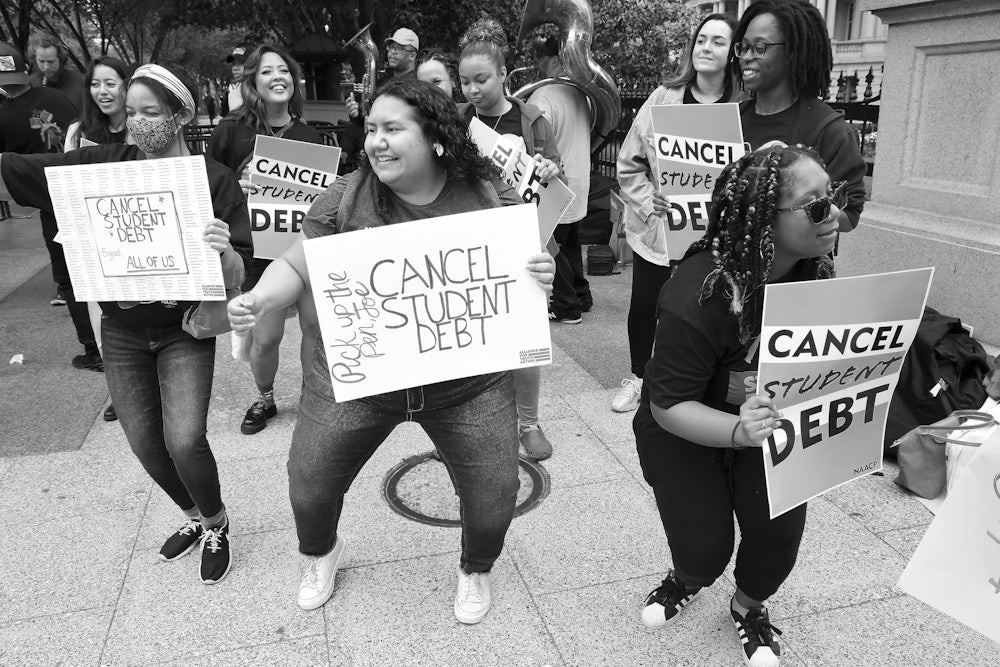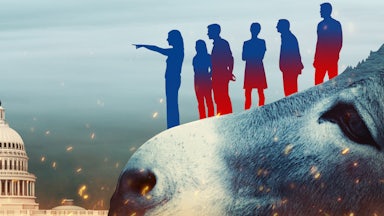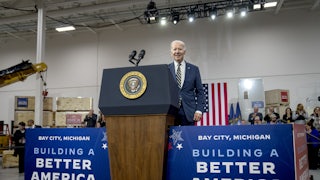When I close my eyes and try to project myself and this country forward three decades in time, my mind darkens. The future, even the not-so-distant future, feels dim and unknowable. I’m worried enough about what the next couple of months and years might bring; I have no idea what life may be like in 2050, beyond a distressing conviction that the climate will become even less stable, global inequality will grow starker, and the United States will continue its descent from the once-elevated position of global hegemon. (The latter development, in and of itself, is not a bad thing, but anticipating how the corresponding international dynamics will shake out is beyond my abilities.)
Such scenarios lend even more urgency to the work ahead. Like many progressives, I envision myriad domestic reforms that could be implemented in the coming decades. A greening of our energy systems, the democratization of both our political system and the wider economy, and the provision of universal health care, sustainable public transit, free higher education, and quality social housing would all be nice. But reflecting on what the future might bring is very different from making a policy wish list—and, in any case, the organizer in me always balks at such litanies. Enumerating what programs should be implemented is easy. The difficulty lies in figuring out how to actually make things happen and who is going to do the work. What’s the strategy? Can we build the solidarity and institutional formations required to pull it off? The future turns on our answers to these kinds of concrete queries.
Good strategizing, inevitably, involves taking honest stock of the political terrain. Currently, things look bleak. At home and abroad, the reactionary right is distressingly strong—a scary prospect made more ominous by a slumping global economy and a lingering pandemic. Meanwhile, the leadership of the Democratic Party appears unable or unwilling to grasp the depth of the crisis, a posture exemplified, most recently, by its lackluster response to the devastating repeal of Roe v. Wade and an inexplicable commitment to addressing inflation in ways that inflict disproportionate and unnecessary pain on the lower and middle classes.
Some of the Biden administration’s highest-profile successes of the last few months—the climate-conscious provisions of the Inflation Reduction Act, student debt cancellation, and the federal marijuana pardons and steps toward decriminalization—only happened because of sustained pressure from grassroots activists and the insurgent wing of the party. It’s the story of student debt cancellation that I know best, because I’ve been organizing around the issue for nearly a decade. Our hard-won victory provides a heartening example of the outsize power that a scrappy, well-organized coalition can wield, and a reminder of how much of a boost Democrats can get from doing things that materially help regular people. As my allies and I correctly prophesied, Biden’s decision to bail out borrowers appealed to folks across the political spectrum. Bridging social and ideological divisions and short-circuiting resentment and cynicism are possible—if we identify common interests.
That also means identifying common enemies—for example, the economic elites and their henchmen who immediately got to work trying to find ways to stymie Biden’s debt cancellation plan. In late September, six Republican-led states filed a lawsuit arguing, among other things, that the profits of student loan servicers should take precedence over the financial well-being of regular Americans. Meanwhile, the Job Creators Network Foundation, the shadowy “small-business” front group funded by billionaires, including Home Depot co-founder Bernie Marcus and the Mercer family, is also pursuing litigation, no doubt with a veritable fleet of lawyers in its employ. GOP megadonors like Marcus already had mountains of money; now they have a Supreme Court onboard with their democracy-destroying mission—further emboldening them to throw every case at the wall to see what sticks.
And yet, the future remains open. Organizers must analyze, strategize, and plan as much as possible, but we also need to be ready for the unexpected and nimble enough to seize the moment. Perhaps a crisis will occur, giving us a chance to pack the court, or abolish it. Where student debt is concerned, we might lose a battle we thought we had won, only to win the war down the road. One of my main activist collaborators just had a baby. The team often jokes about ordering a onesie for her that reads: “Daddy, what was student debt?” We want to help create a world where that question could seriously be asked, and by 2050 it could come to pass.
With that in mind, I’ll make one addition to my policy wish list. By 2050, should our nation and democracy endure, I hope we can overcome a bit of our rugged individualism and formally recognize organizing’s importance to a decent and sustainable society. We need a legal regime that facilitates the development of what some scholars have called “countervailing power”—citizen power that extends beyond the electoral realm. This proposal may seem obscure, but it is hardly unprecedented. Consider labor unions, which are structured and protected by law. We could start by dramatically strengthening that domain and then expand to other organizational formations: tenants unions, debtors unions, consumers unions, worker cooperatives, citizens assemblies, and more. Why shouldn’t the state help our organizing efforts instead of hindering them?
“The future is dark, which is the best thing the future can be, I think,” Virginia Woolf mused in her journal in 1915. We know today, more than she did at the time, what horrible things were in store. But maybe the fact the future feels unknowable, even terrifying, is a good thing, on balance. Certainty—even a false sense of it—has a way of fostering complacency. Wasn’t that part of the problem, not so many years ago, when the conventional wisdom essentially said history was over? People who should have known better were lulled by the false idea that the die had been cast, that their kind of people were in charge, and that nothing would fundamentally change. No need to struggle to bend the moral universe’s arc, to sacrifice your Sundays to endless meetings, or your lunch breaks to texting the skeptical and inviting them to come and join, too.
Amid such uncertainty, organizers know that we must cultivate hope among as many people as we can manage to reach. Real organizing is a kind of alchemy. It’s a process that turns alienation into connection, oppression into strength, despair into dedication, darkness into light. The odds that we’ll win do not look good, but we keep trying. And if we do try, by 2050, the future may actually turn out to be bright.






